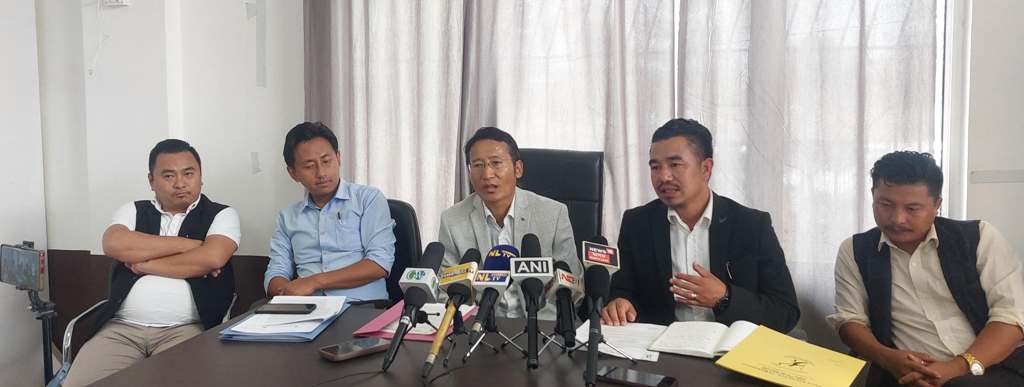FRIDAY, APRIL 25, 2025
- Home
- Naga Students' Federation proposes reforms to Inner Line Permit system in Nagaland
Naga Students' Federation proposes reforms to Inner Line Permit system in Nagaland
Published on Apr 10, 2025
Share

NSF officials addressing a press conference in Kohima on Thursday. (EM Images)
- KOHIMA — The Naga Students' Federation (NSF) Inner Line Regulation Commission (ILRC) on Thursday submitted a memorandum to the government of Nagaland through the chief secretary, urging the state government to enforce the Bengal Eastern Frontier Regulation (BEFR) 1873 in Nagaland and proposing reforms for the Inner Line Permit (ILP).
- Addressing a press conference in Kohima after submitting the memorandum, Senchumo NSN Lotha, the chairman of ILRC, said that the BEFR was born out of the Enabling Act of 1870, which allowed the government to come up with any regulations in any particular area.
- He, however, lamented the negligence and lack of attention towards the enforcement of BEFR 1873.
Also read: Minority communities propose Inner Line Permit exemptions in Nagaland
- Although there are three states in the Northeast—Nagaland, Mizoram, and Arunachal Pradesh—where the regulation is applicable, and Manipur was recently included, he pointed out that Arunachal Pradesh and Nagaland have only been facilitating it, while Mizoram was regimentally enforcing it, and the state has been benefitting from the regulation.
- According to Lotha, one of the pivotal agendas of the ILRC is that the economy of the state should come into its own hands, for which strict and stringent enforcement of the inner-land regulation is a must.
- In its 10-point memorandum, the NSF called for establishing a centralised database system. “The Inner Line Pass (ILP) issued to outsiders entering Nagaland must be stored in a single central location. This will ensure ease of access, consistency and improved security for any outsiders entering Nagaland with vested interest,” it stated.
- Citing the porous borders with Assam, it urged the state government to establish new checkpoints wherever necessary and also re-strengthen the existing ones. “Establishment of new checkpoints must include establishment of an ILP issuing office and checkpoints at the Dimapur Railway Station and Dimapur Airport,” it added.
- Pointing out that the monitoring system after the issue of ILP is “very shallow,” the federation requested the state government to create separate ILP enforcement wings in all the district headquarters.
- Its other recommendations included sensitising the implementing department and its field personnel; transparency in the collection of ILP fees; change in the ILP fee payment method; ease in issuing Inner Line Pass (ILP); scrutinising the purpose of visit; severe penalty for defaulters; and no renewal of ILP after the expiry period.
- “It can be extended only a maximum of two times depending on the circumstances, and further extension should not be allowed. On the expiry of the period, the ILP holder must compulsorily leave the Inner Line Area and apply for a fresh ILP if so required,” it stated.
- Lotha clarified that the NSF-ILRC’s message is very clear—it is not objecting to anybody coming to Nagaland but rather treats them as guests. “But the moment the guest tries to behave like the host, problems start from there. So we would like to send a message that guests should behave like guests, and the host is ever ready to be hospitable.”
- Terming the meeting with the chief secretary as very cooperative, he stated that the CS also shared greater concern and provided further inputs. He expressed hope that the suggestions put forward by the NSF will be fruitful.
- Besides lapses in the enforcement mechanism, he also viewed that lack of awareness among the public as another reason for the ineffective implementation of the ILP. In this regard, he informed that coordination meetings with various civil societies would be held, and visits would also be made to colleges and institutions to create awareness.

